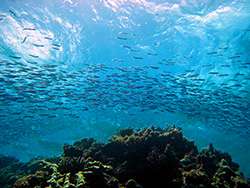(Phys.org) —An international, multidisciplinary team of scientists have combined their expertise to make projections for the future of tropical Pacific fisheries and aquaculture in the 21st century. Their research suggests that predicted climate change in the region will create winners and losers in both fisheries and aquaculture, requiring adaptation by many Pacific Island nations.
Dr Janice Lough, Senior Principal Research Scientist of the Australian Institute of Marine Science (AIMS) was one of the team to collaborate on the project, co-ordinated through the Secretariat of the Pacific Community and part-funded by AusAID. As a specialist in marine climate projections and their consequences for human activities on coral reef ecosystems, Dr Lough provided insights into observed and possible future climates of the tropical Pacific.
"It was extremely rewarding to be a part of this important project which is ultimately about assisting people and governments throughout the tropical Pacific in planning for future food security and economic prosperity," says Dr Lough.
"Fisheries and aquaculture are key economic and subsistence industries for Pacific Island nations and here we attempted to factor climate change models into the long-term productivity of the resources that underpin these industries, many of which are already undergoing changes due to increasing population pressures."
Published today in the prestigious scientific journal, Nature Climate Change, the paper provides comprehensive coverage of the projected climate changes in the tropical Pacific, including regional warming and reduced salinity, increasing rainfall, more intense tropical cyclones and shifting ocean currents. These changes will have knock-on effects for feeding and spawning grounds for key oceanic fisheries, such as skipjack tuna, which is predicted to shift progressively eastwards.
Coastal fisheries in the tropics rely on the coral reefs, mangroves and seagrasses that line their shores and the forecast climate change is expected to intensify the degradation many of these habitats are already experiencing. For example, coral bleaching, powerful cyclones and rising sea levels will reduce the size and complexity of reefs leading to declines in coral reef fisheries.
The picture may be more positive for freshwater fisheries, however, as higher rainfall in the western Pacific may expand rivers and floodplains over 20% by 2100, creating greater capacity for fish stocks, although there are clear risks to other land-use demands in this scenario. Freshwater aquaculture may benefit from temperature rises through increased productivity, but coastal aquaculture may struggle to adapt to changing conditions as these industries typically require specific conditions for cultivation, such as black pearl farming in Polynesia.
Although the economic benefits to the region from an eastward shift in tuna may exceed the threats, the paper highlights the real risk of a 20% climate change-induced decrease in coral reef fish productivity by 2050, combined with increasing population growth in the region. The paper also outlines several adaptation options that would assist Pacific Island nations in ensuring their food and economic security in a changing climate. The paper is not just about what might happen but also the actions necessary (many of which are good practice anyway) to sustain the livelihoods of Pacific people through the 21st century.
Commenting on the paper AIMS CEO, John Gunn, said "clearly, in order to ensure food security in tropical Pacific Island countries we need to see the adoption of sustainable fishing practices that will allow replenishment of fish stocks and safeguard habitats wherever possible".
'Mixed responses of tropical Pacific fisheries and aquaculture to climate change' has been scheduled for Advance Online Publication on the Nature Climate Change website on 11 March 2013.
Journal information: Nature Climate Change
Provided by AIMS





















